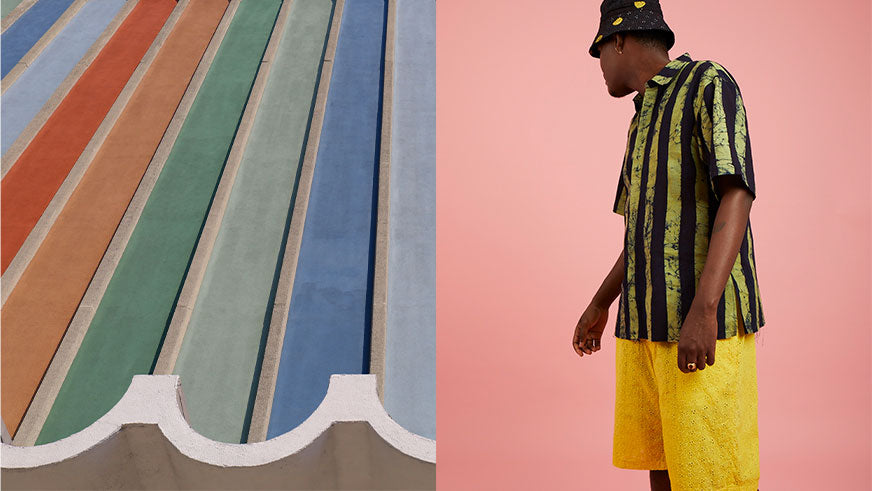That Time I Wanted...
August 2021
Honoring Humanity in the Race to Modernity
Thoughts on the Timeless Architecture of Francis Kéré and How It Influenced Our New Collection
Words by Papa Omotayo
Photography by Zoran Jelenic

Range of Ijebu Shirts in eyelet fabrics.
The early work of Diébédo Francis Kéré, is the inspiration behind the Post-Imperial SS21 collection. In my opinion, Kere’s work has always had a simple premise- How do we honestly represent the aspirations we have for the places we come from? Respecting the history of collective knowledge and tradition of these places; Knowing, that many have been marginalised or displaced, in the race for ‘modernity’.
In doing so, can these new places and stories lie ‘in between the places we come from as Africans, and the places we currently exist in, as globalists’?
I use the word ‘in between’, as reference to my own traditional Yoruba, Ijebu lineage and heritage, (also indicated in the collection) where an Orisha (the spiritual guide) is sought to help bring balance ‘in between’ worlds.
Post-Imperial's passion, vision and inspiration is rooted in Kere’s making of a specific type of ‘gathered space’, to form a collective shared experience. The work speaks to the struggle between liberation and resistance, the limitations of material, context, commerce, aspiration, yet clearly embedded in the collective knowledge of tradition, community and responsibility.
Post Imperial’s designs hint at these themes, in the Osogbo tops and Ijebu shirt series, with their array of lines, dots, patterns and lace-like ‘owambe’ texture. With colours moving from muddy earth tones to rich vibrant hues. The tees feel like the aspired showmanship of Ijebu and Lagos natives. Two places I know well; spaces that navigate showmanship both as a shared communal endeavour and also for power and show-boating. There is an understanding here, as with some of Kere’s insights, a knowledge that all material and textiles palettes are a function as much as they are a ritual texture to the power and mythology of stories. No more so, than in our highly visual age.
Serpentine Pavilion. Images George Rex from London, England, via Wikimedia Commons
How we make objects matters and how we reference this process enlightens new possibilities.
In Kere’s work as with the current Post-Imperial collection, the open and closed spaces interweave with air and sunlight, light and shade, forming bold illumination of colour and pattern in the garments.
In the Ikoyi jacket and Elegushi hat, we see the horizontal lines and dotted illuminations of lights in the window screens from the Gando Primary School, the limitations and possibilities tangible in the clay and laterite earth tones. The indigo blues and timber hues reflect the warm welcome one felt arriving at the gathering space, which made Kere’s 2017 commissioned Serpentine Pavilion in the UK, one of the most beautiful in decades. A celebration of the simplicity of form as an act of collective gathering that felt truly connected to the village tree concept that inspired it.
How we make objects matters and how we reference this process enlightens new possibilities. The place, ideas and people cannot be separated. Nor can the value and ethics of social responsibility from the purpose of ‘object’ making.
Kere has said, ‘The reason why I do what I do is my community’. This is not the language of designed sustainability, but a clarification on the ownership of ideas. The communal participation that will allow and ensure the light of the lines and circles, like those shown in this Post Imperial collection, to endure.
_
Papa Omotayo is an award winning, architect, designer, writer and film maker. Papa’s work strongly focuses on exploring the nature of culture and the context within contemporary Nigerian and the extended African condition, locally and globally. A strong believer in creating work through cross disciplinary collaboration and participation, he strives to find new possibilities for creating nuanced visual narratives in Nigeria (Africa’s) urban centres and beyond.
He is the founder of A Whitespace Creative Agency and Creative Director of MOE+ Art Architecture. He currently lives and works in Lagos, Nigeria.

The Osbogo Top and Elegushi Hat in Indigo. Inspired by the work of Francis Kere.

